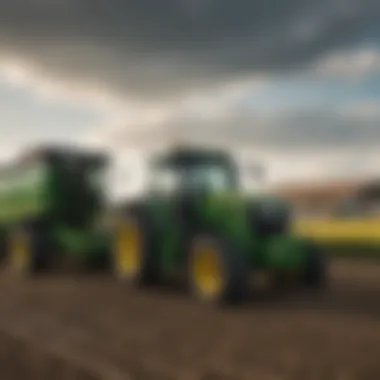John Deere's Impact on Knox, Indiana's Agriculture


Intro
John Deere holds a significant place in the agricultural landscape of Knox, Indiana. This article examines the multifaceted contributions of John Deere operations in this region, shedding light on its historical roots, economic influence, and the range of products offered. Additionally, the article highlights the firm’s commitment to sustainable practices and innovation in farming technologies. A closer look at the community connections reveals how John Deere engages with local agriculture, workforce development, and education initiatives. This exploration not only underscores John Deere’s impact on Knox but also offers insight into future sustainability efforts that align with the evolving needs of modern agriculture.
Preamble to John Deere in Knox, Indiana
The presence of John Deere in Knox, Indiana represents a significant chapter in both local and agricultural history. This section sheds light on the pivotal role the company plays within the community, as well as its impact on the agricultural sector as a whole. Understanding the multifaceted dimensions of John Deere in this area is important, not just for local residents, but also for agricultural enthusiasts. The operations of John Deere extend beyond mere machinery production; they involve deep connections to farming practices and community development.
Overview of the Company
John Deere is a long-established entity recognized globally for its agricultural machinery and equipment. Founded in the 19th century, it has continuously evolved to meet the demands of a changing agricultural landscape. The Knox facility specifically contributes to this legacy, focusing on the production of high-quality equipment designed to enhance productivity for farmers.
The company places significant emphasis on innovation. It has developed a variety of products that cater to the specific needs of different regions. For instance, the equipment built in Knox may have particular features suited to local farming methods and conditions. Overall, John Deere serves not just as a provider of machinery but as a key partner to agricultural progress in Knox.
Historical Background
The history of John Deere extends back to its beginnings in the early 1830s. Initially a blacksmith, John Deere’s invention of the steel plow revolutionized farming. In Knox, this history resonates deeply as the community has benefited from the advancements introduced by the company over years. The local establishment began operations at a time when the agricultural sector was transitioning into more mechanized forms of farming.
Throughout the decades, John Deere has adapted to meet the evolving challenges faced by farmers. This ability to innovate has ensured its place as a leader in agricultural advancements. The company’s historical roots in Knox are a reminder of the important part it continues to play, shaping both local economies and agricultural practices.
Economic Impact of John Deere
The role of John Deere in Knox, Indiana, extends beyond merely providing agricultural machinery; it significantly influences the local economy. This impact can be viewed through the lens of job creation and support for local agriculture. Each of these elements demonstrates how John Deere is not just a business but a vital pillar sustaining the community's economic health and agricultural practices.
Job Creation
John Deere's presence in Knox has created numerous employment opportunities. The facility employs a diverse range of individuals, from assembly line workers to engineers and managerial staff. This employment has a ripple effect on the local economy, providing not just salaries but also encouraging spending in local businesses.
- Direct employment: The factory itself hires hundreds of workers. Many workers have stable, long-term positions, allowing them to plan for the future.
- Indirect employment: John Deere also indirectly supports jobs in surrounding industries, including parts suppliers and logistics. These roles are essential for the smooth operation of the primary facility.
For many families, employment at John Deere represents a pathway to financial stability. This security has positive implications for local schools and infrastructure, as families contribute to the community through taxes and local spending.
Support for Local Agriculture
John Deere's commitment to supporting local agriculture cannot be overstated. Their products are critical to farmers in Knox and the surrounding areas, enabling them to enhance productivity and sustainability.
- Access to advanced technology: Local farmers benefit from the latest agricultural technologies and equipment offered by John Deere. This access helps them to maximize yields.
- Training and education: John Deere often collaborates with local agricultural societies to provide training sessions. These programs help farmers understand how to use new technologies effectively.
- Local partnerships: By sourcing materials and parts from local businesses, John Deere helps strengthen the overall agricultural ecosystem.
"John Deere acts as a bridge between innovation and traditional farming practices, ensuring local farmers stay competitive and informed."
Through these initiatives, John Deere not only supports the farming community but also promotes sustainable practices. This creates a long-term partnership that benefits everyone involved, from the company to the local farmers and ultimately, the consumers who rely on their products.
John Deere Products and Innovations
John Deere's significance in agriculture extends beyond its history. The company is a leader in producing equipment that meets the evolving demands of modern farming. Understanding John Deere Products and Innovations is essential for anyone looking to grasp the full impact this brand has on the agricultural sector, especially in Knox, Indiana.


Product Range
John Deere offers a broad range of products that cater to various needs in the agricultural industry. These products include tractors, harvesters, planters, and other essential machinery that farmers rely on. The diversity in the product line ensures that both large-scale operations and smaller farms can find suitable equipment.
- Tractors: The backbone of many farms, John Deere's tractors come in various sizes and capabilities, designed for tasks ranging from tilling to hauling.
- Harvesters: These machines significantly increase the efficiency of the harvesting process, reducing labor and maximizing output.
- Sprayers and Planters: Advanced technology in these products allows for precision farming, ensuring crops receive the right care during their growth.
The innovation behind these products reflects John Deere's commitment to enhancing agricultural productivity. The company continually invests in research and development to adapt its offerings to the changing landscape of farming.
Technological Advancements
The technological advancements introduced by John Deere are vital in shaping modern agriculture. The company embraces innovation in its equipment to facilitate efficiency and sustainability. Two notable trends in technological advancements are automation and data management.
- Automation: Many of John Deere's products are equipped with automation features. This reduces the need for manual labor and enhances productivity. Farmers can operate machines from a distance, optimizing time spent in the field.
- Precision Agriculture: John Deere integrates technology that allows for better data collection and analysis. Tools such as GPS and sensors help farmers monitor the health of their fields more efficiently. This data-driven approach enables more informed decision-making.
"John Deere's investment in technology is not just about new machines; it’s about creating solutions that empower farmers to work smarter, not harder."
These advancements contribute to sustainable farming practices. By enhancing efficiency and reducing waste, John Deere is helping to shape a more sustainable future for agriculture in Knox and beyond. The emphasis on technology ensures that the company remains a pivotal player in the agricultural equipment sector.
Sustainability Initiatives at John Deere
Sustainability is a central concern for modern agriculture, impacting ecosystems, economic viability, and community well-being. John Deere's sustainability initiatives in Knox, Indiana, reflect a commitment to responsible farming practices and community engagement. Focusing on environmental stewardship and community involvement, these initiatives not only benefit the local landscape but also set a benchmark for the agricultural industry at large.
Environmental Stewardship
John Deere's approach to environmental stewardship can be seen in its dedication to reducing waste, conserving resources, and enhancing biodiversity. The company implements various environmentally friendly practices aimed at minimizing the ecological footprint of its manufacturing processes. This involves:
- Resource Management: John Deere uses innovative methods to optimize resource consumption throughout its factories. By focusing on energy efficiency and reducing water usage, the company minimizes its impact on the environment.
- Waste Reduction: There is an active effort to reduce, reuse, and recycle materials. Operations in Knox have integrated recycling programs that ensure materials are repurposed whenever possible.
- Sustainable Product Design: New models of agricultural machinery are designed with sustainability in mind. These products often utilize less fuel and emit fewer greenhouse gases, contributing to cleaner air and a healthier planet.
"Our commitment to sustainability is reflected not just in our products but in every aspect of our operations. We strive to ensure our presence benefits both the local community and the environment." – John Deere Representative
Community Engagement
Community engagement is another critical aspect of John Deere’s sustainability efforts. The company recognizes the importance of fostering strong ties with local residents and organizations. This engagement manifests in several ways:
- Support for Local Farmers: John Deere actively collaborates with farmers in the area to understand their needs and provide sustainable equipment solutions. This partnership helps boost local productivity while promoting environmentally friendly practices.
- Educational Workshops: The Knox facility hosts workshops focused on sustainable farming methods. These sessions educate local farmers about best practices, ensuring that the community stays informed about new agricultural techniques and sustainability standards.
- Community Projects: John Deere participates in various community projects aimed at improving local infrastructure or green spaces. Such initiatives enhance the quality of life for residents and reinforce the company's investment in the local area.
John Deere and the Future of Farming
Examining John Deere’s role in the future of farming reveals not only its commitment to innovation but also its influence on agricultural practices globallly. The agricultural industry faces numerous challenges, including climate change, resource scarcity, and the need for increased food production. As a leading manufacturer of farming equipment, John Deere stands at the forefront, integrating technological advancements to address these issues while enhancing productivity and sustainability.
Trends in Agricultural Technology
The evolution of agricultural technology is critical to meeting today’s farming demands. John Deere actively contributes to various trends shaping this landscape. One prominent trend is precision agriculture, which utilizes data-driven insights to optimize farming practices. Farmers can monitor soil health, crop conditions, and weather patterns using platforms such as John Deere Operations Center, allowing for informed decisions on planting, watering, and harvesting.
Additionally, the Internet of Things (IoT) plays a key role in modern farming. John Deere implements IoT devices on equipment to gather real-time data. This interconnected approach facilitates better logistics, fleet management, and equipment maintenance.


Moreover, drone technology has become essential for monitoring crop health and field conditions. Drones equipped with specialized cameras can capture data that help farmers make better decisions about their fields. John Deere’s commitment to these technologies highlights its forward-thinking approach to supporting farmers in a rapidly changing environment.
The Role of Automation
Automation in agriculture is not merely a trend but a transformative force. John Deere’s advancements in automation aim to increase efficiency and reduce labor costs. Automated equipment, such as the John Deere ExactEmerge planter, adjusts planting rates to optimize seed placement, ensuring higher yields with less wastage.
Field robots are also gaining traction in John Deere’s portfolio. These machines can perform tasks like weeding and harvesting, reducing the need for human labor. In regions where labor shortages are common, automated solutions offer a practical alternative.
The use of autonomous tractors further exemplifies John Deere's innovation. They can work autonomously on large fields, enabling farmers to focus on strategic tasks rather than manual operation. This shift allows for more time-efficient farming and ultimately leads to increased productivity.
"John Deere's innovations in automation are reshaping the agricultural sector. Automation not only enhances efficiency, but it also enables sustainable farming practices."
In summary, John Deere is pivotal in steering the future of farming through its commitment to agricultural technology and automation. By embracing these trends, farmers can not only enhance their productivity but also tackle broader challenges within the agricultural sector.
Education and Workforce Development
Education and workforce development play a crucial role in the sustainability and growth of John Deere operations in Knox, Indiana. As the agricultural landscape evolves, so does the need for skilled professionals who can leverage advanced technology to enhance productivity. John Deere recognizes this demand and actively engages in programs that bridge the skill gap, ensuring that the local workforce is well-prepared for the challenges of modern agriculture.
Partnerships with Educational Institutions
John Deere in Knox has established significant partnerships with local educational institutions. These collaborations enable the co-creation of curricula that align with industry needs. Programs in agricultural technology and engineering are tailored to provide students with hands-on experience and knowledge about the latest advancements in machinery and equipment.
One notable institution is the North Judson-San Pierre School Corporation. By working closely with this local school, John Deere enhances educational offerings, which allows students to gain relevant exposure to machinery operation and maintenance. Additionally, partnerships with vocational schools provide pathways for students toward certifications in agricultural fields.
The impact of these partnerships is evident. Students emerge from these programs equipped with the skills necessary for roles in agriculture that demand both technical expertise and practical experience. This not only benefits John Deere but also supports the local economy by creating a highly skilled workforce.
Training Programs and Opportunities
John Deere also invests in training programs aimed at current employees and new recruits. These programs are designed to facilitate ongoing professional development, ensuring that the workforce remains adept in using new technologies and methods. For instance, John Deere offers specialized training on precision agriculture techniques, focusing on data analytics and equipment management.
Furthermore, these training initiatives often include:
- Workshops: Hands-on sessions that engage participants in using the latest equipment.
- Online Courses: Flexible learning options for employees to upskill at their own pace.
- Internships: Opportunities for students to gain real-world experience while still in education.
Such programs not only enhance the workforce's capabilities but also foster a culture of continuous learning and improvement within the company. John Deere's commitment to education and training underscores the importance of a knowledgeable workforce in addressing the challenges of today’s agriculture.
Investing in education ensures that John Deere remains at the forefront of industry innovations, ultimately benefitting both the company and the community. When highly trained individuals join the agricultural workforce, they contribute to a more efficient and productive sector.
Through these efforts, John Deere not only mitigates potential labor shortages but actively contributes to the overall development of the agricultural community in Knox, Indiana.
Challenges and Opportunities in Knox
The landscape of Knox, Indiana, is shaped by various factors that create challenges and opportunities for John Deere and the broader agricultural community. Understanding these dynamics is essential for grasping how the company adapts and thrives amidst these conditions. The challenges posed by economic fluctuations and competition within the agricultural sector are profound, yet they also present avenues for innovation and growth.
Economic Fluctuations


Economic fluctuations are a significant concern for John Deere in Knox. The agricultural industry is inherently volatile, influenced by changing market demands, weather patterns, and global trade policies. In periods of economic downturn, farmers might cut back on investment in new machinery or technology, directly impacting sales for companies like John Deere. It creates a challenging environment that requires constant adaptation to market changes.
Particularly in Knox, where agriculture forms the backbone of the local economy, understanding the relationship between broader economic indicators and local agricultural viability is crucial. Factors such as commodity prices can fluctuate widely, and farmers must make strategic decisions based on these trends. John Deere has to keep a pulse on these price changes and adapt its product offerings and pricing strategies accordingly.
Moreover, economic fluctuations often lead to increased pressure on farmers to find operational efficiencies. John Deere can address this challenge by focusing on providing cost-effective solutions that enhance productivity. Emphasizing innovation will allow the company not just to react, but to anticipate the needs of its customers during tough economic periods.
Competition in the Agricultural Sector
Competition in the agricultural sector is another pressing challenge that John Deere faces in Knox. As the global marketplace evolves, new players enter the field, offering alternative machinery and technology that can rival established brands. This competition necessitates a strong emphasis on product differentiation, quality, and customer service.
Local manufacturers and international brands alike are vying for the attention and loyalty of farmers. John Deere must ensure it stands out by highlighting its commitment to quality, sustainability, and innovation. Incorporating feedback from local farmers and understanding their unique needs can provide John Deere with a competitive edge.
The firm has a distinct advantage due to its longstanding history in the industry and a well-established reputation. However, it must not become complacent. Continuous investment in research and development is crucial, allowing John Deere to stay ahead of the technological curve. This includes exploring advancements in precision agriculture and smart farming solutions that respond to farmers' evolving needs.
Additionally, John Deere can leverage its community engagement initiatives to bolster local relationships. By actively participating in Knox community events and supporting local farmers, the company can create a strong local brand presence that resonates with the farmers in the area. Building trust is paramount in the face of competition, and fostering these connections can lead to increased loyalty and market share.
"Understanding the challenges posed by economic fluctuations and competition equips John Deere with the insights necessary to innovate and succeed in Knox, Indiana."
Community Perspectives on John Deere
Understanding the community perspectives on John Deere in Knox, Indiana, is essential to grasping the full scope of the company's influence. This section delves into the views and experiences of local residents, highlighting the significance of John Deere as a major player in the local economy and culture. The relationship between the company and the community reflects both benefits and challenges, offering insight into how a large corporation can shape local identity and values.
Local Opinions and Experiences
Local opinions about John Deere vary, with many residents expressing pride in having such a prominent employer in Knox. The jobs provided by John Deere are seen as a lifeline for many families, contributing to the welfare of the community. Numerous individuals have shared personal stories about how their lives have been significantly impacted by working for John Deere. Employees often emphasize the stability afforded by their jobs, which allows them to support their families and invest in the local economy.
However, not all perspectives are entirely positive. Some residents voice concerns regarding environmental impact and the sustainability of farming practices associated with large-scale operations. Discussions often revolve around balancing economic growth with environmental stewardship. These debates reveal a nuanced understanding of the company’s impact on daily life in Knox, and how citizens navigate these realities.
"John Deere means jobs for a lot of us. But we have to think about what those jobs mean for our farmland and air quality."
Community Events and Involvement
John Deere contributes to the Knox community not just through employment, but also through active engagement in local events. The company sponsors various community gatherings, agricultural fairs, and educational workshops. Such involvement fosters a sense of unity and helps build relationships beyond the workplace. Residents appreciate these initiatives as they provide opportunities for families to gather and celebrate local culture.
Additionally, John Deere’s presence has spurred other local businesses to thrive, supporting surrounding markets and services. The interconnectedness of the company and local life is evident in these partnerships. Local businesses benefit from the increased foot traffic brought in by community events associated with John Deere.
In summary, community perspectives on John Deere reveal a complex relationship marked by both pride and concern. Residents are keenly aware of the advantages that come from living in a community supported by a major employer. Their opinions highlight the importance of ongoing dialogue about the future, ensuring that growth aligns with ecological considerations.
The End
The significance of John Deere's presence in Knox, Indiana goes beyond simple manufacturing. This article highlights critical factors that shape the relationship between John Deere and the local community. The historical context provides a backdrop that illuminates how the company emerged as a pillar of economic stability and growth.
Recap of Key Findings
- Economic Contributions: John Deere has bolstered the local economy through job creation and support for agriculture. The manufacturing facility generates numerous employment opportunities for residents, which directly impacts the community's financial health.
- Innovations in Technology: The company's commitment to technological advancement in agriculture, such as precision farming tools and automation, showcases their role in modernizing farming. This shift is essential for improving productivity and sustainability in a changing environment.
- Sustainability Initiatives: Through environmental stewardship and community engagement, John Deere has demonstrated a proactive approach towards sustainability. Their efforts in reducing carbon footprints and engaging with local farmers on sustainable practices reflect an understanding of their responsibility to both the land and the community.
- Education and Workforce Development: John Deere's partnerships with educational institutions emphasize the importance of equipping the next generation with skills necessary for the agricultural sector. These initiatives not only prepare students for potential careers but also ensure a steady workforce for the company.
- Community Relations: Local opinions highlight a strong connection between John Deere and the Knox community. Their involvement in local events fosters a sense of unity and collaboration, which strengthens their integration into the community’s fabric.
Future Considerations
As Knox and its local agriculture industry continue to evolve, several factors will become pivotal:
- Technological Integration: Adoption of emerging technologies will be crucial for maintaining competitive advantages in farming. John Deere must focus on not just marketing these technologies but also making them accessible to local farmers.
- Economic Resilience: Navigating economic fluctuations will require strategic planning and adaptability from both John Deere and the community. Maintaining a focus on local partnerships and initiatives will be beneficial as economic conditions change.
- Sustainable Practices: Continued commitment to sustainability will be pivotal in preserving the land for future generations. John Deere should reinforce its sustainability efforts, ensuring they are at the forefront of operations.
- Enhanced Community Engagement: Ongoing dialogue with local residents will build stronger relationships and a shared vision for the future. Engaging in more community-driven initiatives can further enhance their local reputation.
In summary, John Deere's multifaceted role in Knox, Indiana illustrates its importance in shaping both the agricultural landscape and the broader economy. By continuing to innovate and strengthen community ties, the company can ensure that it remains a vital part of Knox's future.







